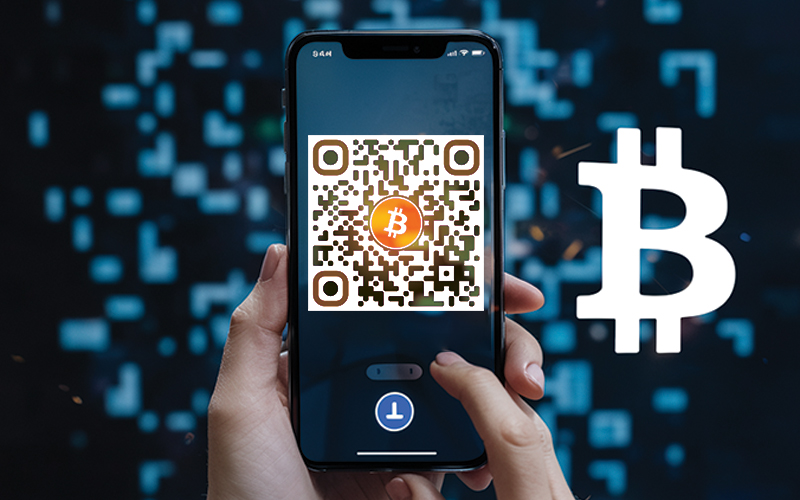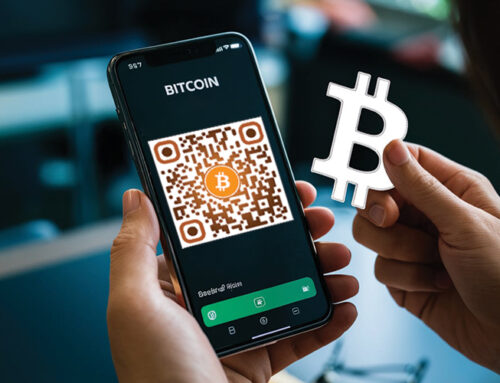QR codes, or Quick Response codes, have surged in popularity over the past few years. These two-dimensional barcodes can be scanned by smartphones and other devices, allowing users quick access to information. QR codes are utilized across various industries, from retail to marketing, and have become a popular method for Bitcoin payments.
This article delves into the basics of QR codes, their usage for Bitcoin payments, and the benefits of using bitcoin wallet QR code.
What is a QR Code?
A QR code is a two-dimensional barcode readable by smartphones and other devices. It consists of black squares arranged on a white background in a square grid. QR codes can store up to 4,296 alphanumeric characters, making them versatile for various applications, including website URLs, contact information, and Bitcoin addresses.
History of QR Codes
QR codes were invented in 1994 by Denso Wave, a subsidiary of Toyota, to track vehicles during the manufacturing process. They have since evolved into a widely used tool for quickly accessing digital information.
QR Code vs. traditional barcodes
Traditional barcodes are one-dimensional and can hold about 20 numerical digits, while QR codes are two-dimensional and can store significantly more information. This makes QR codes much more versatile for modern applications.
How QR Codes work?
When you scan a QR code with your smartphone, the device’s camera captures the image and a QR code reader software interprets the pattern of black and white squares. This pattern is then converted into data that your phone can understand, such as a URL or an address.
QR codes use a combination of encoding modes (numeric, alphanumeric, byte/binary, and kanji) to store data efficiently. This allows them to store various types of information, from simple text to complex data structures like Bitcoin addresses.
Applications of QR Codes
- Retail Industry
In retail, QR codes allow customers to access product information, check prices, and make payments quickly. They enhance the shopping experience by providing instant access to product details and offers. - Marketing Campaigns
Marketers use QR codes to direct potential customers to websites, promotional pages, or social media profiles. QR codes on advertisements can lead to higher engagement rates by making it easy for users to access more information or participate in promotions. - Event Management
QR codes are used in event management for ticketing and check-in processes. Scanning a QR code can quickly verify tickets and streamline entry, reducing wait times and improving the overall attendee experience. - Inventory Management
Businesses use QR codes to track inventory efficiently. Scanning a QR code on a product can update inventory levels in real time, helping maintain accurate stock records and manage supply chains effectively.
QR Codes in Bitcoin payments
1. Generating Bitcoin addresses
To use QR codes for Bitcoin payments, the first step is generating a Bitcoin address. This can be done using a Bitcoin wallet application or website. The address is a unique string of characters that identifies the destination for the Bitcoin transaction.
2. Creating QR Codes for Bitcoin
Once you have a Bitcoin address, you can create a QR code that encodes this address. This QR code can be shared with others to receive payments. Scanning the QR code with a Bitcoin wallet app will automatically input the address, simplifying the payment process.
3. How merchants accept Bitcoin via QR Codes
Merchants can accept Bitcoin by displaying a QR code containing their Bitcoin address. Customers scan the code with their Bitcoin wallet app, enter the amount to be paid, and confirm the transaction. This method is fast, secure, and reduces the risk of errors compared to manually entering an address.
Advantages of Using QR Codes for Bitcoin Payments
1. security benefits
QR codes enhance security by eliminating the need to manually enter Bitcoin addresses, reducing the risk of errors and fraudulent transactions. Since QR codes can be scanned directly from the user’s device, there is less chance of interception by malicious actors.
2. convenience and speed
Using QR codes for Bitcoin payments is quick and convenient. Users simply scan the code, and the payment details are automatically populated, saving time and effort. This seamless process makes transactions more efficient for both buyers and sellers.
3. cost-effectiveness
Bitcoin transactions using QR codes can be more cost-effective than traditional payment methods. There are typically lower transaction fees, and the process is straightforward, reducing the need for additional payment processing services.
Bitcoin QR Code Wallets
A Bitcoin QR code wallet is a type of wallet that allows users to store, send, and receive Bitcoin using QR codes. These wallets are becoming increasingly popular due to their ease of use and enhanced security features.
Bitcoin QR code wallets generate QR codes for Bitcoin addresses, which can be scanned to make payments or receive funds. The wallet stores these addresses and corresponding private keys, allowing users to manage their Bitcoin securely and conveniently.
Benefits of crypto wallet qr code over Traditional Wallets
Bitcoin QR code wallets offer several advantages over traditional wallets, including enhanced security, ease of use, and the ability to quickly generate and scan QR codes for transactions. These features make them a preferred choice for many users.
Wanna set up a Bitcoin QR Code wallet?
Challenges and Limitations
Despite their benefits, Bitcoin QR code wallets are not without risks. Potential issues include the loss of private keys, malware attacks, and the risk of scanning malicious QR codes.
Technical limitations, such as the need for a reliable internet connection and potential compatibility issues with older devices, can affect the usability of Bitcoin QR code wallets.
Conclusion
QR codes have become increasingly popular and provide an excellent method for making Bitcoin payments. They offer security, convenience, and cost-effectiveness, making them an ideal choice for those looking to use cryptocurrency. Additionally, Bitcoin QR code wallets allow users to store, send, and receive Bitcoin using QR codes, simplifying the payment process.
FAQs
1. What are QR Codes?
QR codes are two-dimensional barcodes that can be scanned by smartphones and other devices to quickly access information such as URLs, contact details, or payment addresses.
2. How do QR Codes work?
QR codes work by encoding data into a pattern of black and white squares. When scanned, the data is decoded and interpreted by a QR code reader app, allowing users to access the information quickly.
3. Can QR Codes be used for Bitcoin payments?
Yes, QR codes can be used for Bitcoin payments. They simplify the payment process by encoding Bitcoin addresses, which can be scanned to automatically input payment details.
4. Are Bitcoin QR Code wallets secure?
Bitcoin QR code wallets are generally secure, especially when proper security measures are taken. These include using strong passwords, enabling two-factor authentication, and regularly backing up the wallet.
5. What are the benefits of using QR Codes for Bitcoin payments?
The benefits include enhanced security, convenience, speed, and cost-effectiveness. QR codes reduce the risk of errors and fraud, making Bitcoin transactions safer and more efficient.


It’s hard to find knowledgeable people on this topic, but you sound like you know what you’re talking about! Thanks
Hello there, just became alert to your blog through Google, and found that it is
really informative. I am going to watch out for brussels.
I’ll be grateful if you continue this in future. Lots of people will be benefited from your writing.
Cheers!